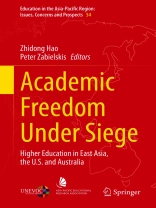This book argues that academic freedom in higher education in East Asia, the U.S. and Australia is under stress. Academic freedom means freedom to teach, research, and serve in multiple political and social roles based on professional principles. It is closely linked to shared governance, in which academics participate in and influence decision making in core academic concerns such as choosing new faculty, faculty promotion, tenure decisions and the approval of new academic programs.
In different countries and regions, the duress confronting academic freedom may come from different directions, and the ability of faculty to share power can vary greatly. In authoritarian mainland China, it is mostly political and ideological controls that greatly affect academic freedom, and shared governance is very much limited. In semi-democracies like Hong Kong and Macau and democracies like Taiwan, Japan, South Korea, the U.S. and Australia, corporatization and commercialization havehad great impact on both academic freedom and shared governance.The result is that the roles professors play within academia are continually being diminished and the academic profession is struggling to maintain its ground. Similar developments are also occurring in Europe. These developments should cause great concern to educators, researchers and policymakers everywhere. The authors collected here present attempts to learn from current practice in order to move policy into directions that will help protect higher education as a common good.
This book highlights the importance of academic freedom and provides insights into the ways it is being infringed both by commercialization and corporatization on the one hand and political repression on the other. It vividly illustrates detailed case studies and empirical data that make it a compelling read.- Professor Ruth Hayhoe, University of Toronto, Canada
Academic freedom is as important today as at any time in the last century. The authors point out the challenges that academic freedom faces on a global scale. The import of the book is in its comparative perspective steeped in data and analysis. Thoughtful. Cogent. Compelling. – Professor William G. Tierney and Professor Wilbur-Kieffer, University of Southern California, United States
विषयसूची
1 Academic Freedom under Siege: What, Why, and What Is to Be Done; Zhidong Hao.- 2 Commercialization and Corporatization vs. Professorial Roles and Academic Freedom in the U.S. and Greater China; Zhidong Hao.- 3 The Role of Commercialization and Corporatization in University Shared Governance: An American Case Study; Zhaohui Hong.- 4 Professors as Intellectuals in China: Political Roles and Academic Freedom in a Provincial University; Zhidong Hao and Zhengyang Guo.- 5 Academic Staff’s Dual Role in China: Academic Freedom in a Prestigious University; Xiaoxin Du.- 6 Freedom to Excel: Performativity, Accountability and Educational Sovereignty in Hong Kong’s Academic Capitalism; Wai-wan Vivien Chan, Hei-hang Hayes Tang and Ross Lap-kin Cheung.- 7 In Search of a Professional Identity and Academic Freedom: Higher Education in Macau and the Academic Role of Faculty; Zhidong Hao.- 8 How Commercialization and Corporatization Affect Academic Freedom in Higher Education: A Case Analysis of a University in Taiwan; Emily Jin-Jy Shieh and Sheng-Ju Chan.- 9 Turtles or Dragons? Academic Freedom in Japanese Universities; Edward Vickers.- 10 South Korea: Managerial Wisdom in Higher Education for a Selective Academic Repression; Jae Park.- 11 Commercialization and Corporatization: Academic Freedom and Autonomy under Constraints in Australian Universities; Linda Hancock.- 12 Afterword; Peter Zabielskis.
लेखक के बारे में
Zhidong Hao is Emeritus Professor of Sociology at the University of Macau. He obtained his Ph D in sociology from the City University of New York in 1995 and taught at Whittier College the following year. In 2003, he went to the University of Macau after a year of Fulbright Scholarship research in Taiwan on national identity and the role of intellectuals. He was Program Coordinator of the China Studies Program, Chair of the Department of Sociology, and Director of the Social Science Research Center on Contemporary China in Macau. Prior to his Ph D studies in New York he taught English at Hebei Teachers’ University in northern China. He has extensive experience in higher education in both Chinese and U.S. contexts.
Peter Zabielskis is Associate Professor of Anthropology at the University of Macau, where he teaches courses in cultural anthropology, theory, religion, the environment, and the anthropology of art. He previously taught at the Cooper Union for the Advancement of Science and Art, New York, and at New York University where he received his Ph D. His research interests include material culture, art, architecture, religion, heritage and the urban built environment in Macau and Southeast Asia, especially Penang in Malaysia.












